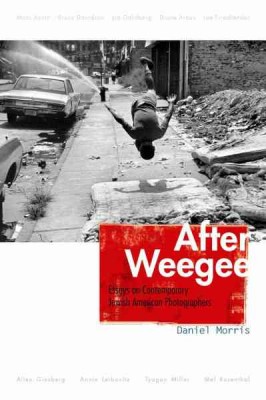| After Weegee: Essays on Contemporary Jewish American Photographers Contributor(s): Morris, Daniel (Author) |
|
 |
ISBN: 0815609876 ISBN-13: 9780815609872 Publisher: Syracuse University Press OUR PRICE: $26.96 Product Type: Hardcover Published: June 2011 |
| Additional Information |
| BISAC Categories: - Photography | Individual Photographers - Essays - Photography | Criticism |
| Dewey: 770.923 |
| LCCN: 2011016670 |
| Series: Judaic Traditions in Literature, Music, & Art (Hardcover) |
| Physical Information: 1.06" H x 6.36" W x 9.24" (1.31 lbs) 340 pages |
| Themes: - Ethnic Orientation - Jewish |
| Descriptions, Reviews, Etc. |
| Publisher Description: Examining a range of styles from the gritty vernacular sensibility of Weegee (Arthur Fellig) to the glitzy theatricality of Annie Leibovitz, Morris takes a thoughtful look at ten American photographers, exploring the artists' often ambivalent relationships to their Jewish backgrounds. Going against the grain of most criticism on the subject, Morris argues that it is difficult to label Jewish American photographers as unequivocal outsiders or insiders with respect to mainstream American culture. He shows it is equally difficult to assign a characteristic style to such a varied group, who range from self-taught photographers to those trained in art school. In eclectic ways, however, the contemporary photographers highlighted in After Weegee carry on the social justice and documentary tradition associated with Sid Grossman, Aaron Siskind, and the primarily Jewish Photo League of the 1930s by chronicling the downside of the Reagan revolution of the 1980s. Rather than record movements or trends in current Jewish American photography, Morris focuses in-depth on the work of Bruce Davidson, Jim Goldberg, Mel Rosenthal, Diane Arbus, Lee Friedlander, Allen Ginsberg, Annie Leibovitz, Tyagan Miller, and Marc Asnin. Like Weegee, these photographers share a tendency toward socially informed expression and an interest in self-expression via the operations of photography, inevitably shaped by histories of socially conscious or documentary imaging. Moving between photo history, cultural history, and close readings of the images, Morris traces a common thread among contemporary secular Jewish American photographers, artists who link the construction of personal identity to the representation of history. After Weegee broadens our understanding of the relationship between Jewishness and contemporary photography, challenging us to take a fresh look at much of what has come to be canonized as modern, postwar, and art photography. |